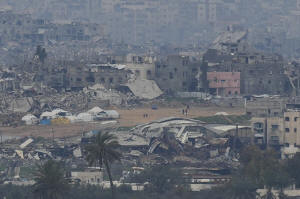Trump repeats pledge to take control of Gaza even as pressure mounts to
renew ceasefire
 Send a link to a friend
Send a link to a friend
 [February 10, 2025]
By MOHAMMAD JAHJOUH and TIA GOLDENBERG [February 10, 2025]
By MOHAMMAD JAHJOUH and TIA GOLDENBERG
MUGHRAQA, Gaza Strip (AP) — New details and growing shock over emaciated
hostages renewed pressure Sunday on Israeli Prime Minister Benjamin
Netanyahu to extend a fragile Gaza ceasefire beyond the first phase,
even as U.S. President Donald Trump repeated his pledge that the U.S.
would take control of the Palestinian enclave.
Talks on the second phase, meant to see more hostages released and a
complete Israeli withdrawal from Gaza, were due to start Feb. 3. But
Israel and Hamas appear to have made little progress, even as Israeli
forces withdrew Sunday from a Gaza corridor in the latest commitment to
the truce.
Netanyahu sent a delegation to Qatar, a key mediator, but it included
low-level officials, sparking speculation that it won’t lead to a
breakthrough. Netanyahu, who returned after a U.S. visit to meet with
Trump, is expected to convene security Cabinet ministers on Tuesday.
Trump weighs in on Gaza again
Speaking on Sunday, Trump repeated his pledge to take control of the
Gaza Strip.
“I’m committed to buying and owning Gaza. As far as us rebuilding it, we
may give it to other states in the Middle East to build sections of it.
Other people may do it through our auspices. But we’re committed to
owning it, taking it, and making sure that Hamas doesn’t move back.
There’s nothing to move back into. The place is a demolition site. The
remainder will be demolished," he told reporters onboard Air Force One
as he traveled to the Super Bowl.

Trump said Arab nations would agree to take in Palestinians after
speaking with him and insisted Palestinians would leave Gaza if they had
a choice.
“They don’t want to return to Gaza. If we could give them a home in a
safer area — the only reason they’re talking about returning to Gaza is
they don’t have an alternative. When they have an alternative, they
don’t want to return to Gaza."
Trump also suggested he was losing patience with the deal after seeing
the emaciated hostages released this week.
“I watched the hostages come back today and they looked like Holocaust
survivors. They were in horrible condition. They were emaciated. It
looked like many years ago, the Holocaust survivors, and I don’t know
how much longer we can take that,” he said.
Israel has expressed openness to the idea of resettling Gaza's
population — ”a revolutionary, creative vision,” Netanyahu told his
Cabinet on Sunday — while Hamas, the Palestinians and much of the world
have rejected it.
Egypt said it will host an emergency Arab summit on Feb. 27 to discuss
the “new and dangerous developments.”
Trump’s proposal has moral, legal and practical obstacles. It may have
been proposed as a negotiation tactic to pressure Hamas or an opening
gambit in discussions aimed at securing a normalization deal between
Israel and Saudi Arabia.
Saudi Arabia condemned Netanyahu’s recent comment that Palestinians
could create their state there, saying it aimed to divert attention from
crimes committed by “the Israeli occupation against our Palestinian
brothers in Gaza, including the ethnic cleansing they are being
subjected to.”
Qatar called Netanyahu’s comment “provocative” and a blatant violation
of international law.
Hostage families say time is running out
Families of remaining hostages said time is running out as some
survivors described being barefoot and in chains.
“We cannot let the hostages remain there. There is no other way. I am
appealing to the cabinet,” said Ella Ben Ami, daughter of a hostage
released Saturday, adding she now understands the toll of captivity is
much worse than imagined.
The father of a remaining hostage, Kobi Ohel, told Israel's Channel 13
the newly released men said his son, Alon, and others "live off half a
pita to a full pita a day. These are not human conditions.” Ohel's
mother, Idit, sobbed as she told Channel 12 her son has been chained for
over a year.
Michael Levy said his brother, the newly released Or Levy, had been
barefoot and hungry for 16 months. “The decision-makers knew exactly
what his condition was and what everyone else’s condition was, and they
did not do enough to bring him back with the urgency that was needed,"
he said.
[to top of second column]
|

Palestinians are seen near destroyed buildings by Israeli
bombardments inside the northern Gaza Strip as seen from southern
Israel, Sunday, Feb. 9, 2025. (Photo/Ohad Zwigenberg)

On Saturday, as Israelis reeled, former defense minister Yoav Gallant
said on social media that the deterioration in hostages’ conditions was
something “Israel has known about for some time.”
The ceasefire's extension is not guaranteed
The ceasefire that began on Jan. 19 has held, raising hopes that the
16-month war that led to seismic shifts in the Middle East may be headed
toward an end.
The latest step was Israel forces' withdrawal from the 4-mile
(6-kilometer) Netzarim corridor separating northern and southern Gaza,
which was used as a military zone. No troops were seen in the vicinity
Sunday. As the ceasefire began last month, Israel began allowing
hundreds of thousands of displaced Palestinians to cross Netzarim and
return to the north.
But the deal remains fragile. On Sunday, civil defense first responders
in Gaza said Israeli fire killed three people east of Gaza City.
Israel's military noted “several hits” after firing warning shots and
warned Palestinians against approaching its forces.
Cars piled with belongings headed north. Under the deal, Israel should
allow cars to cross Netzarim uninspected. Troops remain along Gaza’s
borders with Israel and Egypt.
Hamas spokesperson Abdel Latif Al-Qanoua said the troops' withdrawal
showed the militant group had “forced the enemy to submit to our
demands" and thwarted “Netanyahu’s illusion of achieving total victory.”
Israel has said it won’t agree to a complete withdrawal from Gaza until
Hamas’ military and political capabilities are eliminated. Hamas says it
won’t hand over the last hostages until Israel removes all troops.
During the ceasefire's 42-day first phase, Hamas is gradually releasing
33 Israeli hostages captured during its Oct. 7, 2023, attack that
sparked the war in exchange for the release of nearly 2,000 Palestinian
prisoners and a flood of humanitarian aid to Gaza.
Israel has said Hamas confirmed that eight of the 33 are dead.
Families of the hostages gathered in Tel Aviv to urge Netanyahu to
extend the ceasefire, but he is also under pressure from far-right
political allies to resume the war. Trump's proposal for the U.S. to
take control of the Gaza Strip may also complicate the situation.

“They are dying there, so we need to finish this deal in a hurry,” said
Ayala Metzger, daughter-in-law of hostage Yoram Metzger, who died in
captivity.
The war in Gaza, sparked by Hamas’ attack that killed 1,200 people and
took 250 hostage, has killed more than 47,000 Palestinians, according to
local health authorities, who do not differentiate between fighters and
noncombatants in their count. Much of the territory has been
obliterated.
Violence in the occupied West Bank
Violence has surged in the occupied West Bank during the war and
intensified in recent days with an Israeli military operation against
Palestinian militants in the territory's north.
On Sunday, the Palestinian Health Ministry said Israeli gunfire killed
two women, one of them, Sundus Shalabi, eight months pregnant. It said
Rahaf al-Ashqar, 21, was also killed. The shooting occurred in the Nur
Shams urban refugee camp, a focal point of Israeli operations.
Israel's military said its police had opened an investigation.
Israel’s Defense Minister Israel Katz on Sunday announced the expansion
of the operation that started in Jenin several weeks ago. He said it was
meant to prevent Iran — allied with Hamas — from establishing a foothold
in the West Bank.
___
Goldenberg reported from Tel Aviv, Israel. Associated Press writers
Natalie Melzer in Tel Aviv, Israel, Jon Gambrell in Dubai, United Arab
Emirates, Isabel DeBre in Ramallah, West Bank, and Darlene Superville,
traveling aboard Air Force One, contributed to this report.
All contents © copyright 2025 Associated Press. All rights reserved |